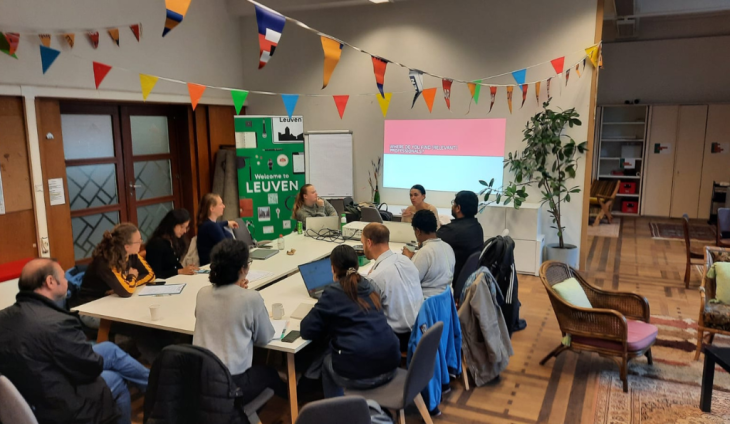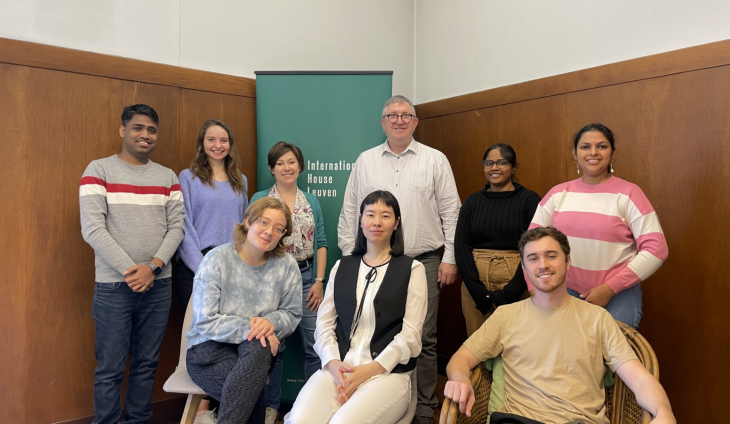“A job-seeker’s paradise.” That’s the best way to describe Expatival 2025, the International House’s bi-annual expat-themed festival that just took place on May 17th. The event was dedicated to helping internationals settle in Leuven, learn about the city’s quirks and secrets, and showcase all of the rich diversity of cultures it hosts.
Info sessions ranged from raising multilingual kids and bike maintenance 101 to a deep dive into global cultures in the Human Chapters event. Even those who pride themselves in being Leuven experts walked away with new insights.
While there are numerous angles to take from Expatival, I, a recent graduate from KU Leuven, was particularly interested in learning about the job market in Leuven. So, without further ado, here are five takeaways I gained from Expatival.
Leuven’s Strength is its Internationality
As an international, it’s easy to be bogged down by the hurdles of expat life — from permits and bureaucracy to culture shock and language barriers. Expatival featured a team of experts, including immigration lawyers, HR professionals, and language instructors to address many of these common challenges. But even as the info sessions acknowledged the difficulties of being an international in Belgium, there was one clear message across all of the sessions: being an international is a strength, not a weakness.
Living abroad offers a unique insight into a country’s culture. It provides a reference point that locals, who have grown accustomed to their way of life, may not possess. Companies can benefit from this international perspective, as it brings a diverse set of skills and approaches to solving problems. For jobseekers, the very act of living abroad shows your resilience and capability to overcome challenges: navigating foreign systems, communicating across cultures, and cutting through red tape.
Instead of downplaying your international background, highlight it. It can be tempting to hide the fact that your candidacy requires additional paperwork, but your background is an asset. Instead, focus on why you're worth the extra paperwork. Perhaps you come from a native English background and can provide copywriting services, or maybe you grew up in a tourist destination and can help a travel agency plan a destination.
The key is determining the value of your perspective.
Integration is Key
Compared to other cities, Leuven can make it easy to live here as an international. KU Leuven offers more than 100 programs in English, the Flemish rank as one of the world’s most proficient English speakers, and the city hosts attractive international organizations and events.
Because of this, it’s easy to procrastinate integrating into Flemish life, particularly learning the language. After all, the Flemish are renowned for accommodating others, including internationals, when they sense a struggle. You may have experienced this yourself: you muster up the courage to order a drink in Dutch, you walk up to the counter, and ask, “Mag ik een koffie, alsjeblieft?” and instantly, you become disappointed as soon as you hear English roll off their tongue back at you. It’s an all too common experience amongst internationals, and this kind gesture of switching to English which largely dissuades internationals from learning the language. It can be difficult when the government emphasizes that residents must learn the language, but attempts to practice it are largely shut down. It may feel like “je met je rug tegen de muur staat” (you're standing with your back against the wall) or that you’re caught between a rock and a hard place.
Still, I’d encourage you not to write off integration, especially if you hope to build a long-term life in Flanders. Integration goes beyond just language, allowing you to view life through the lens of a local. A coffee shop isn’t just “cozy,” it’s gezellig. When your bike disappears, your first instinct is to check the fiets centrale (and your second step is to invest in a bike that doesn’t look worth stealing!). You can communicate easier with locals, switching to Dutch when an English word isn’t understood. It’s this act of meeting people where they’re at, which the Flemish know well, that shows respect toward a culture and a people, while also making everyone’s life easier.
But beyond respect, integrating signifies your appetite to live here, especially in the eyes of an employer. When employers consider international candidates, they are making a long-term investment into not only their company but you as a person. Integration doesn’t have to be just about language learning; joining a sports team or starting a club are all ways to reflect this desire. And if you do decide one day to become a citizen, language proficiency is a requirement for Belgian nationality, so it can’t hurt to pick up een beetje Nederlands!
Finally, don’t underestimate the value of local friends, one of the key ways you can set yourself up for a successful future in Leuven. Given Leuven’s reputation as a revolving door city, having native friends ensures that you have a reliable group of friends, and maybe even one that can show you a different side of the city or even help you build your network for finding a job!
Job Services are Readily Available
Belgium invests so heavily in its population through subsidies for health care, education, transportation, and other city services, it naturally makes sense that they would want to retain talent, so there are various support organisations for (international) jobseekers.
VDAB (the Flemish Employment Service) helps train job-seekers to find work on the Belgian market. VDAB partners with multiple organizations to offer services to improve the skills of job seekers: language classes, work coaching, and vocational training, just to name a few. (For similar options outside of Flanders: Actiris in Brussels and LeForem in Wallonia.)
During my search year, I have been enrolled in VDAB’s program, which has included subsidies for Dutch language classes at CLT (Center for Living Languages - one of the Leuven language schools), a career coach who provides tailored resume feedback, and a recruiter to recommend open roles and help navigate the complexities of the Belgian labor market.
Besides VDAB, the International House offers regular career workshops, immigration consultations and other support for jobseekers. Then there’s also Leuven’s “Leerwinkel” (learning shop) which can provide guidance about studying, your foreign degree recognition or education.
If you already have access to the labor market, signing up with recruitment and even temp agencies (temporary work) can also provide a great starting point.
Employment is a Two-way Street
Many recent graduates are eager to jump into the workforce and accept their first job offer, especially in a competitive market. Add to that the ticking clock of a visa deadline for internationals, and the pressure to accept the first job offer can feel overwhelming.
However, in the info session titled “What Recruiters Look For in Potential Hires” led by Human Resource managers, the panelists encouraged job applicants to re-frame their perspective toward one more like dating: compatibility must exist on both sides.
An employee should feel strongly about the company’s mission, as well as be confident that they can carry out the duties of the role efficiently, or at least, learn the skills quickly. Accepting a job offer at the drop of a hat can lead to dissatisfaction with the line of work, which in turn has made some employers wary of hiring internationals who may leave prematurely.
To avoid mismatch, both the company and the candidate should thoroughly assess the fit. Employers already do this — vetting their candidates through interviews, tests, and trial periods. I’d encourage you, as a potential hire, to flip the script and do your own line of ‘vetting’ by asking questions to the hiring manager. These can include questions about the work-life balance, company culture, or opportunities to move up the career ladder. Most managers aren’t intimidated by this line of questioning; in fact, all of the panelists at the session encouraged this inquisitiveness, as it showed interest to the hiring team. And if the fit isn’t quite right for you, this could mean even declining an offer.
Networking Happens Everywhere
The first thing that most job coaches will stress to job-seekers is the importance of building a network—creating a web of relationships with professionals for career purposes. Traditionally, this means attending networking events such as career fairs or mixers hosted by companies or universities. In my opinion, these traditional types of networking events are often given disproportionate weight. They are usually overly formal, create a transactional environment, and put the job-seeker in the position of ‘selling’ themselves at the shake of a hand.
I’ve been to several of these types of events, and while I’ve made some great connections and received work from these events, they are not where I’ve found the majority of my business or connections. In fact, I’ve developed most of my professional connections and gigs through more informal meetups — volunteering at community events, a spontaneous conversation in a hostel, and, yes, even at an expat-themed festival!
There is a case to be made for a more organic type of networking that avoids the fancy suits and drinks and interacts with people in a more natural environment where they can display multiple sides of their personality.
Expatival may not be branded as a traditional networking event, but there was no shortage of opportunities to connect: from industry experts and recruiters to up-and-coming career professionals such as artists and photographers to showcase their skills. All this unfolded while enjoying some lekker Mexican food (a must for a Californian like myself), sipping a cold Belgian beer, and vibing to the IHL’s band performance.



